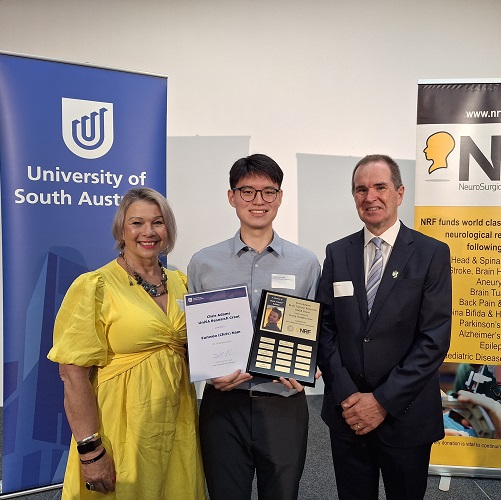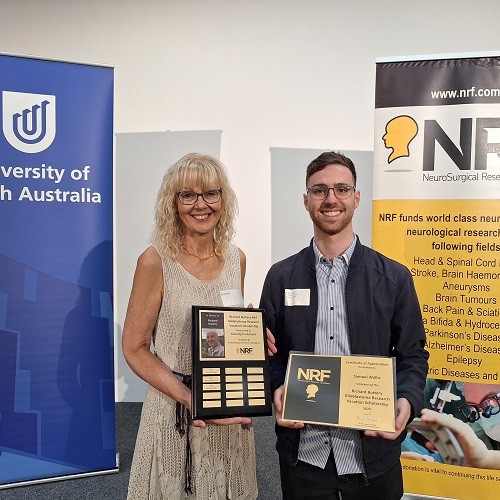16 February 2024

L-R: Cherrie Adams, Eunwoo (Chris) Nam and Martin Adams
The University of South Australia acknowledges the extraordinary impact of the NeuroSurgical Research Foundation (NRF), which celebrated its 60th year of kickstarting brain and spinal cord research in 2023 by recording its highest levels of funding yet.
In the NRF’s final round of 2023 grants announced recently, the five latest awards took annual donations for UniSA’s Centre for Cancer Biology (CCB) to more than $1 million and helped to attract Federal funding of $32 million.
UniSA Research Professor Stuart Pitson, Head of the Molecular Therapeutics Laboratory at the CCB, says the NRF’s support is helping the brain cancer research community continue its strong growth by providing seed funding for students and early career researchers, and facilitating additional high-impact grants.
“These scholarships and awards not only contribute to better patient outcomes, but also celebrate the lives and ongoing impact of the award namesakes,” Prof Pitson says.
The Richard Buttery and NRF Glioblastoma Research Vacation Scholarship was among those presented last week. This enabled recipient Samuel Wallis to explore a potential career in glioblastoma research through an eight-week UniSA placement – 10 years after Richard’s passing.

Kerry Buttery and scholarship recipient Samual Wallis
The Chris Adams Research Grant was established in 2015, in memory of Chris Adams who died at the age of 26 as a result of brain cancer. It has funded six recipients to date, with the latest, UniSA PhD candidate Eunwoo (Chris) Nam, supported to present his research overseas, where he will gain feedback and information to bring back to the CCB’s research community.
Alongside this, the Adams family are funding two Strong Enough To Live PhDs, named after their mantra for life. These were awarded to Bryan Gardam who will investigate Dendritic Cell and T-Cell combination immunotherapy, and Dione Gardner-Stephen who will be assessing treatment options for the childhood cancer medulloblastoma.
Ginta Orchard, Executive Officer of the NRF, says it’s important people know that grassroots fundraising, including rattling cans and participating in fun runs, has an exponential impact.
“Every little bit counts and can be turned into something more,” Orchard confirms.
Each year, approximately 2000 people in Australia are diagnosed with 100 different types of brain cancer, and most of them – 78% – do not live beyond five years.
A full list of recipients can be found here.
Support CCB’s vital work in cancer research.
Media contact: Megan Andrews E: Megan.Andrews@unisa.edu.au



